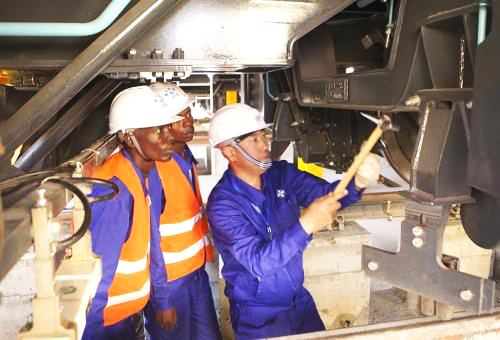Song Wei, an associate research fellow at the Chinese Academy of International Trade and Economic Cooperation said in his article Better funding mix to help clear misreading of China engagement in Africa that the WB and IMF have directly criticized Chinese lending to Africa, which it said would drive Africa into a debt crisis. With the continuous expansion of China's concessional loans to Africa, countries on that continent have successively expressed concerns. In this case, China should continue to improve its management model of development assistance.
China should strengthen communication and consultation with parties, NGOs and community members in host countries, so as to improve project recognition and avoid project suspensions caused by power changes. China may promote mixed financing by implementing models such as "free aid plus concessional loans" and "interest-free loans plus concessional loans" to reduce repayment pressures on recipient countries.
The full text of the article is as follows:
The government of Sierra Leone recently announced the cancellation of the China-funded Mamamah International Airport project, citing "uneconomic" construction as the reason. Some Western media took this opportunity to smear China-Africa development cooperation, saying that the Sierra Leone incident set a precedent that may allow more African countries to reexamine their cooperation with China.
Yet, Western traditional narratives cannot cover up the truth, because this isn't the first time such an incident has happened in cooperation between China and Africa. If anything, it only points to another "open plot" in the Western-led global governance system.
According to Sierra Leone, the World Bank (WB) and the IMF warned that the project would increase its debt burden. Instead of building the Mamamah airport, the African country chose to renovate its current airport near Freetown. Since passengers need to use boats or helicopters to use the airport from the city, the government is considering building a bridge connecting the airport and the downtown area.
Obviously, it was reluctant to cancel the airport project, but had to do so to comply with requirements based on the debt assessments of the WB and IMF..
The IMF and WB jointly set "cross-default clauses" to constrain recipient countries. When a member country applies for a loan from the IMF, the IMF requires the prospective borrower to apply for a WB loan first or at the same time, and the borrower should also comply with the lending requirements set by the WB in the loan agreement. Of these "cross-default clauses," the "external debt warning line" is an important indicator.
Because of the global financial crisis and anti-globalization moves, there has been a decline in developed countries' ability and political willingness to provide aid, making the IMF and WB important external financing sources for African countries. Thus, the IMF and WB continue to use the "external debt warning line" to put pressure on African recipient countries.
China also feels the pressure. The WB and IMF have directly criticized Chinese lending to Africa, which it said would drive Africa into a debt crisis. With the continuous expansion of China's concessional loans to Africa, countries on that continent have successively expressed concerns. For instance, according to a Zambian fiscal official, Zambia is concerned about accepting future Chinese concessional loans because the WB and IMF have informed the country that it has reached its debt ceiling and if it continues to borrow, it is likely to face penalties.
Apparently, the West has used its dominant position in global governance to set the rules, and it has restrained developing countries and emerging donor countries with its rules. To suppress emerging donor countries, the West has chosen to sacrifice the development of developing countries, threaten them with the "external debt warning line," and push emerging donor countries into a situation of moral hazard.
As one of the poorest countries in Africa, Sierra Leone undoubtedly has no bargaining power with the West and has to succumb to international pressure to slow its process of interconnected development.
In addition to recognizing the nature of the Sierra Leone case, China should continue to improve its management model of development assistance.
A host country's risk analysis and evaluation involves such factors as domestic politics, diplomatic relations and economy, and these decisions cannot be simply made based on Chinese companies' loan applications. Therefore, the host government, the Chinese embassy and policy banks should coordinate to conduct comprehensive evaluations.
China has always said less and done more, which led to misunderstandings by people in recipient countries. China should strengthen communication and consultation with parties, NGOs and community members in host countries, so as to improve project recognition and avoid project suspensions caused by power changes.
China may increase direct investment in Africa and improve the profit-making capability of African countries through technical spillovers. China may promote mixed financing by implementing models such as "free aid plus concessional loans" and "interest-free loans plus concessional loans" to reduce repayment pressures on recipient countries.




 A single purchase
A single purchase









